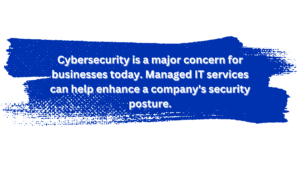In the digital age, IT departments are the backbone of any business. Yet, managing IT can be complex and time-consuming. Enter managed IT services. These services can streamline operations, enhance security, and save costs. They offer a proactive approach to IT issues, reducing emergencies and downtime.
Understanding Managed IT Services
Managed IT services refer to the practice of outsourcing IT tasks.
This is done to improve business operations and cut costs.
A Managed Service Provider (MSP) is a company that manages a client's IT infrastructure. Most providers do this under a subscription model.
MSPs offer a range of services, including:
- IT support
- Cybersecurity measures
- 24/7 monitoring
- Regular updates and maintenance
- Compliance with industry regulations
- Disaster recovery planning
- Data protection services
- Software licensing
Most services can be tailored to meet a business's specific needs, making managed IT services a flexible and scalable solution.
Why Businesses Should Consider Managed IT Services
Managed IT services are crucial in today’s fast-paced digital business landscape. It supports daily operations and drives growth. However, managing IT in-house can be costly and time-consuming, and it can also distract from core business functions.
By outsourcing IT tasks to an MSP, businesses can enjoy numerous benefits. These include cost savings, access to expert talent, and enhanced security. This allows businesses to focus on what they do best while the MSP takes care of their IT needs.
Cost Savings and Predictable Budgeting
One of the main benefits of managed IT services is cost savings. Maintaining an in-house IT team can be expensive, and it involves salaries, benefits, training, and other overhead costs.
With an MSP, businesses pay a fixed monthly fee. Covering all business IT needs, from routine maintenance to 24/7 emergency support. This model provides predictable budgeting, which is crucial for financial planning.
Here are some ways managed IT services can save costs:
- Reduced labor costs: No need to hire, train, and retain an in-house IT team.
- Lower infrastructure expenses: MSPs use their own hardware and software, reducing the need for businesses to invest in expensive IT infrastructure.
- Predictable budgeting: With a flat monthly fee, businesses can easily plan their IT budget without worrying about unexpected costs.
Access to Expertise and Specialized Talent
Managed IT services provide access to a team of IT experts. These professionals have specialized knowledge in various IT fields. They stay updated with the latest technology trends and industry best practices.
With an MSP, businesses can tap into a pool of talent that would be costly to maintain in-house. This is especially beneficial for small—to medium-sized businesses, which may not have the resources to hire full-time IT specialists.
Moreover, MSPs can provide expert advice on IT strategies. They can help businesses make informed decisions about their IT infrastructure, leading to improved efficiency and productivity.
Enhanced Security and Compliance
Cybersecurity is a major concern for businesses today. Managed IT services can help enhance a company's security posture. They do this by implementing robust security measures and protocols.
MSPs also provide regular security audits and updates. They ensure that a business's IT systems stay protected against the latest threats. This proactive approach can significantly reduce the risk of data breaches. In addition, MSPs can help businesses comply with industry regulations and standards.
They can assist with:
- Ensuring data privacy and protection
- Meeting specific compliance requirements for industries like healthcare (HIPAA) or legal (GDPR)
- Regularly updating systems to comply with changing regulations
With an MSP, businesses can focus on their core operations, knowing their IT systems are secure and compliant.
Proactive Monitoring and Maintenance
Managed IT services offer proactive monitoring and maintenance of IT systems. This means potential issues are identified and addressed before they can cause significant problems. This proactive approach can lead to fewer IT emergencies and less downtime.
MSPs also provide regular updates and maintenance to ensure IT systems run smoothly. They can manage software updates, patch management, and system optimization, which helps maintain IT systems' performance and reliability.
With 24/7 monitoring and support, business owners can have peace of mind knowing that their IT systems are being looked after by a team of experts who are ready to respond to any issues at any time.
Scalability to Match Business Growth
One key benefit of managed IT services is their scalability. As a business grows, its IT needs will also change. MSPs can easily adjust the services they provide to match these changing needs.
This scalability can also support business expansion into new markets or regions. With an MSP, businesses can ensure their IT infrastructure can handle this growth and access a diverse team of IT professionals with various areas of expertise.
Improved Efficiency and Productivity
Managed IT services can lead to significant improvements in efficiency and productivity. Outsourcing IT tasks to an MSP allows businesses to free up their internal staff to focus on their core competencies which can lead to increased productivity and efficiency.
MSPs can provide training to staff on cybersecurity best practices and new technologies, further enhancing productivity by ensuring employees are well-equipped to use the company's IT systems effectively. Managed IT services can help businesses optimize their operations. They can improve efficiency, boost productivity, and ensure that staff are well-trained and equipped to handle the company's IT needs.
Strategic IT Planning and Consulting
Managed IT services can play a crucial role in strategic IT planning and consulting. MSPs can provide businesses with a customized IT roadmap for future technology investments, which can help them navigate the complexities of technology integration and digital transformation initiatives.
MSPs can provide strategic advice and consultation based on data analysis and industry best practices, helping businesses stay ahead of IT trends and make informed decisions about their IT infrastructure. Managed IT services can be a valuable partner in strategic IT planning. They can provide expert advice, help businesses plan for the future, and ensure that IT initiatives align with business objectives.
24/7 Support and Minimized Downtime
Another critical benefit of managed IT services is the provision of 24/7 support. This means businesses can have peace of mind knowing that their IT systems are being monitored around the clock. This constant vigilance can lead to faster resolution of IT problems and minimized downtime.
MSPs can also provide end-user support. They can assist with software updates, patch management, and training staff on cybersecurity best practices. This can enhance the customer experience through reliable and efficient IT operations.
Managed IT services can provide businesses with the support they need to ensure their IT systems are running smoothly. This can lead to improved IT infrastructure reliability and a better customer experience.
Vendor Management and Software Licensing
Managed IT services can also be crucial in vendor management and software licensing. MSPs have partnerships with major technology vendors, which can provide businesses with cost-effective solutions for technology procurement. Have you ever “known a guy or gal” and got a better deal? MSPs get that too! They can also assist with software licensing, ensuring businesses comply with all necessary regulations. In essence, managed IT services can help businesses navigate the complexities of vendor management and software licensing, ensuring compliance and cost-effectiveness.
Focus on Core Business Functions
One of the most significant benefits of managed IT services is that they allow businesses to focus on their core competencies. By outsourcing IT needs to a managed service provider, businesses can dedicate more time and resources to what they do best: running a profitable company.
Managed IT services can also support business expansion into new markets or regions. With a reliable IT partner, businesses can grow confidently and adapt to changing technology landscapes.
MSPs can free up valuable time and resources, allowing businesses to focus on their core functions and strategic goals. This can lead to improved efficiency, productivity, and, ultimately, business success.
Choosing the Right MSP for Your Business
Choosing the right Managed Service Provider (MSP) is crucial for reaping the full benefits of managed IT services. Businesses should look for an MSP that understands their unique IT challenges and can provide customized solutions.
Choosing a local MSP that understands the nearby business landscape is advantageous. They can provide insights and recommendations based on local industry trends and regulations.
The right MSP can be a strategic partner, helping businesses navigate the complexities of technology integration, stay ahead of cyber threats, and achieve their long-term IT and business objectives. It's about finding a partner that aligns with your business goals and can provide the support you need.
Conclusion
Managed IT services offer numerous benefits for businesses of all sizes. From cost savings and access to specialized talent to enhanced security and strategic IT planning, these services can significantly improve business operations.
Choosing the right MSP is crucial to fully leveraging these benefits. With the right partner, businesses can focus on their core competencies, knowing their IT needs are in capable hands. Managed IT services are about managing technology and fostering growth and innovation in the business landscape.
Photo Credit: Hire A Geek Online






You must be logged in to post a comment.